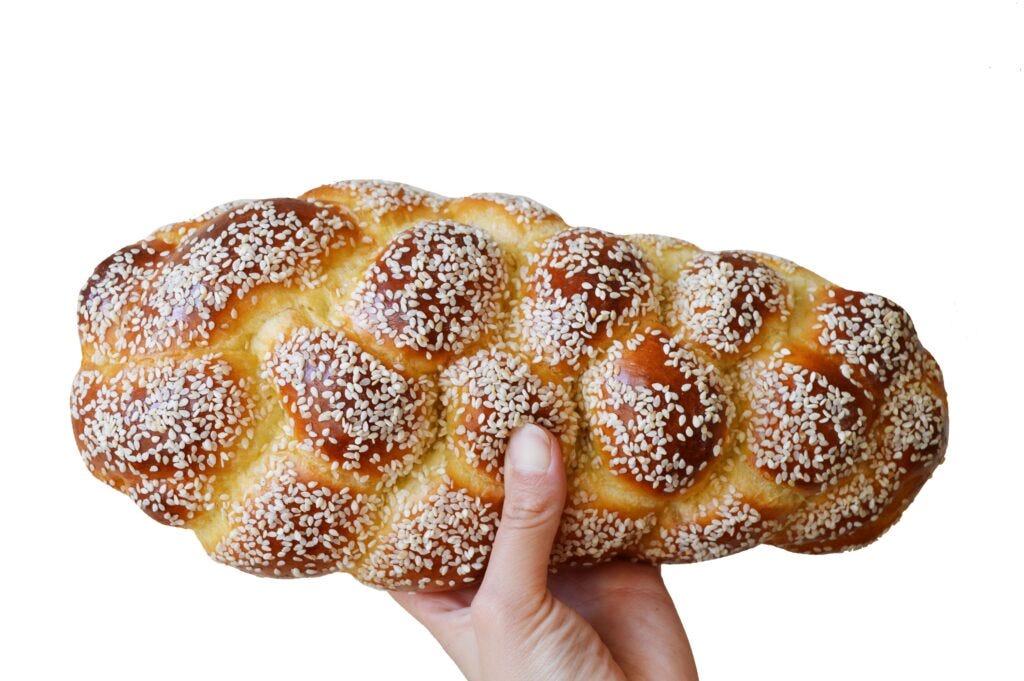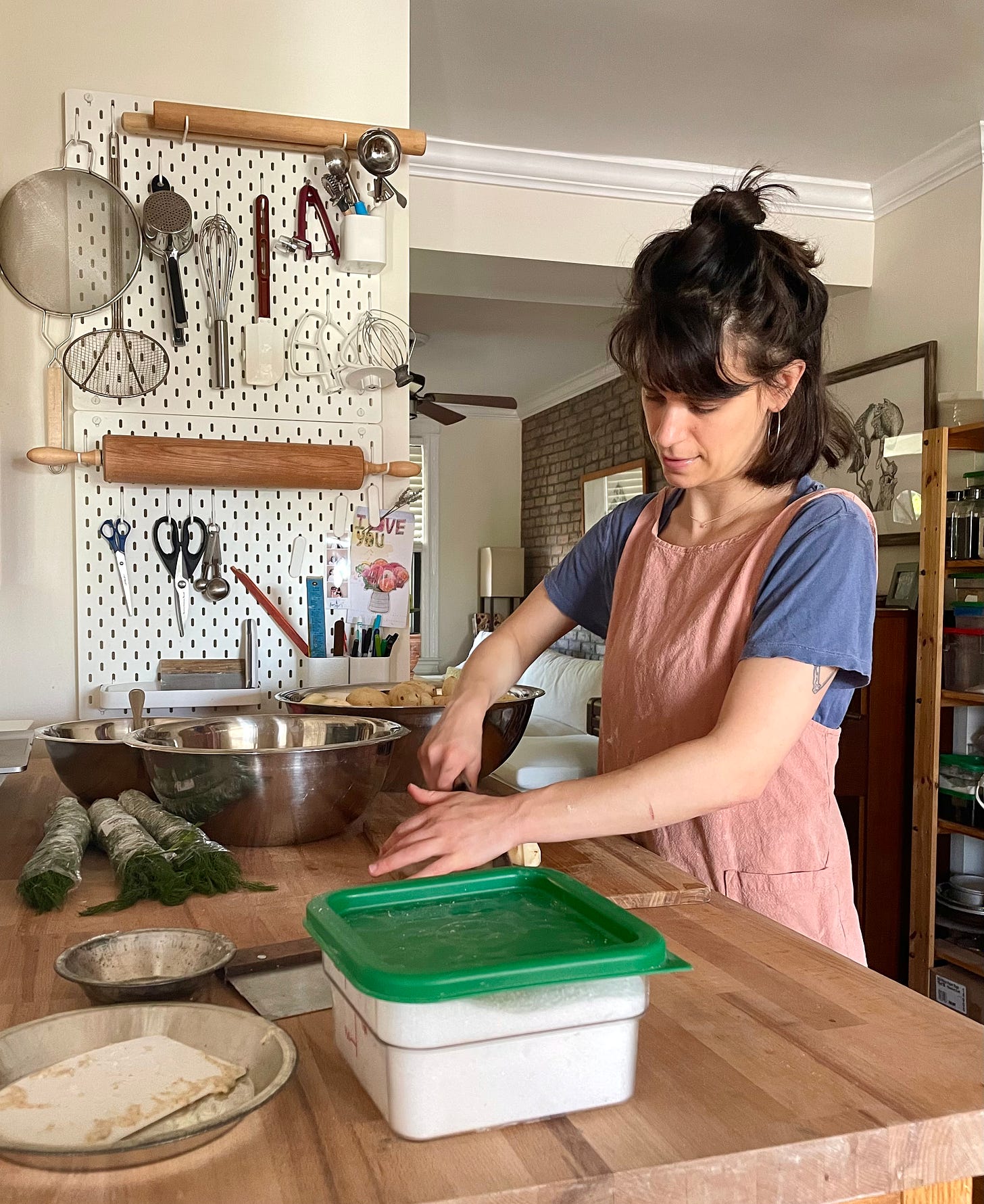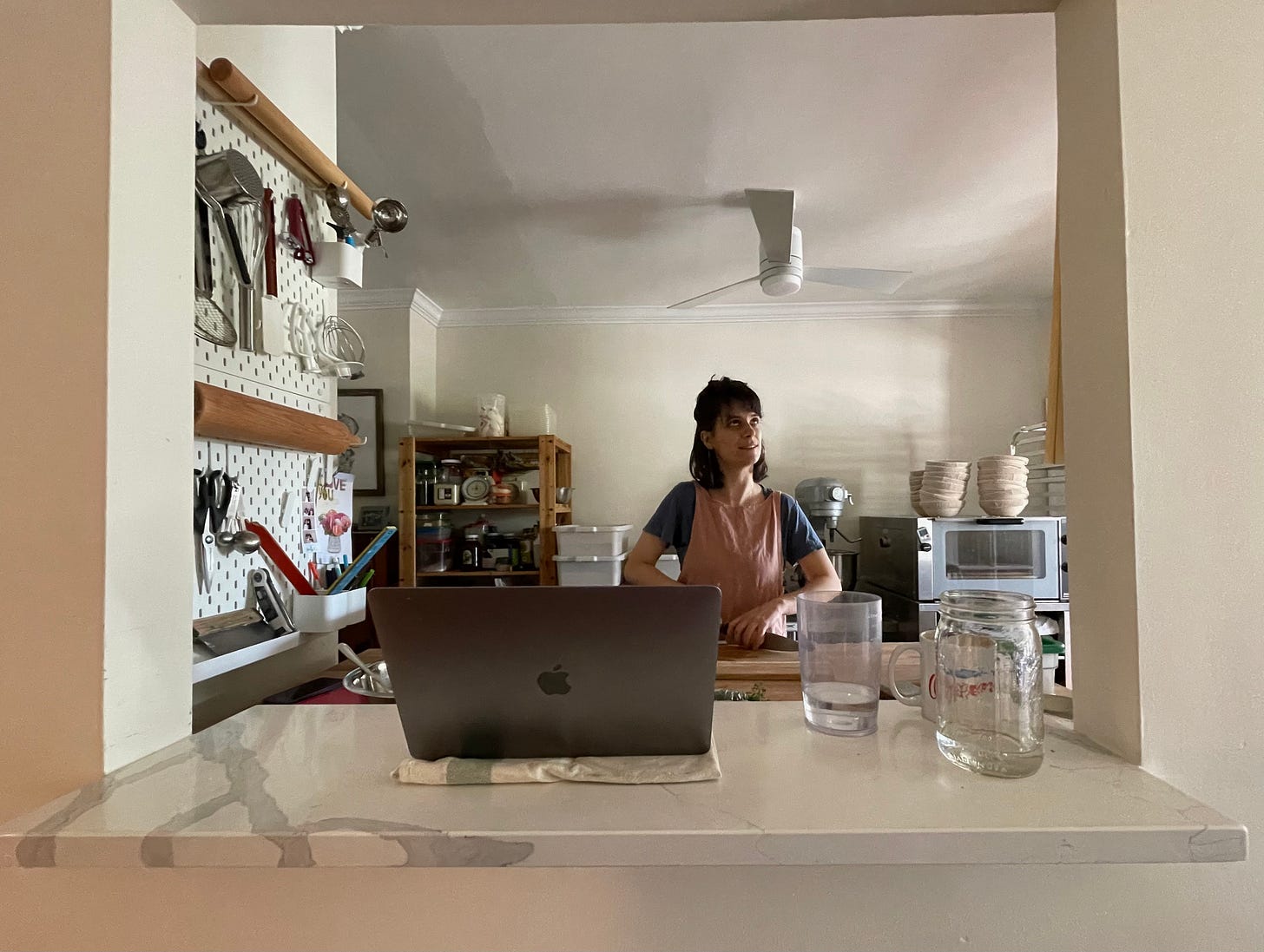If you were to ask me where to buy the best challah in DC, I would direct you to the corner of Irving and Hobart streets in Mount Pleasant. You’ll reach a house at the end, I’ll tell you, and tucked away on the porch is a small Ikea cabinet stocked with perfect golden loaves that look like they came out of an illustrated children’s book about Shabbat.
You won’t be able to take one, that is unless you’ve pre-ordered it from Velvel Breads, a CSA bakery based that launched in November 2021. The menu includes typical Ashkenazi Jewish classics (bagels, rugelach, babka), but also the deep cuts (knishes and bialys). Malted choco chip cookies, focaccia, donuts and coffee cake, a new addition for July, are also part of a monthly rotation. Not everything is Jewish per se, but they’re all items that wouldn’t be unfamiliar at a kiddush lunch. I should also note the Mount Pleasant cabinet isn’t the only location to find Velvel’s weekly bakes. Customers can choose from spots in Petworth and Takoma Park when they place their orders.
After seeing Velvel Bread’s launch announcement on the local blog, Prince of Petworth, and tasting a few of their goods, I was curious to know who was behind the new micro bakery. The D.C. food scene is mighty, but small. As someone who closely follows its comings-and-goings, I was surprised how Velvel seemed to be veiled in secrecy. I gave the Instagram account a follow, dug around on their website, but the answer eluded me.
I don’t want to make it seem like this was some grand mystery and this week’s newsletter is the story of how I solved it. I just responded to the email address that sends out confirmation and order pick-up reminders and asked if I could interview her for this newsletter. Turns out it wasn’t some scheme to hide her identity. She’s just, as she puts it, “really bad at social media.” Luckily she agreed to my request (“This sounds so fun!”) and a few weeks later I showed up at Velvel Breads HQ ready for Mother Sauce’s first-ever profile. And it’s about another Hannah: Hannah Wolfman-Arent.
Hannah greets me at her Petworth DC home where she prepares and bakes all of her wares for the week. But before I can dive into any questions, she needs to tend to her bread dough, meticulously measuring out water and Diamond Crystal salt into a Cambro container, then pouring that mixture into a larger bin containing the sourdough. Soon the contents will be divided, shaped and baked to become crusty breads. That is after the dough is done fermenting and proofing.
After the dough is sorted, Hannah heads back to her work station to begin peeling potatoes for the knishes, another nosh available on this week’s menu. Peeling is a mindless activity, more conducive for interviewing, which is why she planned to tackle her mountain of tubers during my visit.
Hannah’s baking schedule is somewhat rigid, but at least that’s by her own design. The pandemic – as is the case with many restaurant workers – made her realize how grueling kitchen hours could be. She was finally starting to get her “sleep normal” and realized, “maybe I don’t want to be up at 5 a.m. or 4 a.m. anymore. I don't really want to be at another place at that hour…I just always worked the Saturday or Sunday, or both. I don't want to do that again.”
She didn’t mind if she had to be up early in her own home, though. So after many years baking in other people’s kitchens on other people’s schedules, Hannah struck out on her own to have more control – both over her hours and what she was making. “I just wanted something that felt more like mine and creative. I was ready for the next step,” she describes. Velvel, in case you’re wondering, is a Yiddish boy’s name meaning “wolf,” a nod to Hannah’s last name.
A CSA model with pre-order monthly subscriptions would allow her to gauge demand, which was almost impossible to keep up with at first. Now in the summer months, things are slowing down as people head off on vacations and can’t commit to month’s worth of baked goods. Hannah added half-month challah subscriptions to allow for more flexibility.
Nearly seven months into the new venture and Hannah is happy with the results. “I’m really proud of what I’ve done so far. I feel like a lot of the customers seem to really love the stuff and that’s great,” she says. Whether the business model needs tweaking, that’s a different question. “It definitely is a lot of work and…I’m definitely working some of the hardest in my life,” Hannah adds. “The profit margins are just really slim. I’m still trying to determine if this is working, if I’m making enough money that this is sustainable. I’m still not really sure.” Rising ingredient costs hasn’t helped revenue either. Though perhaps some publicity in a small local newsletter will help with the bottom line? (Hint hint: order Velvel Breads here.)
Before starting her own shop, Hannah had been overseeing the pastry program at Doubles,1 a coffee shop in DC’s Park View neighborhood. There she produced scones, blondies, cookies, turnovers for hungry customers to consume alongside their pour overs and lattes.
All in all, Hannah estimates she’s spent about seven years working in restaurants. A stint in the Jewish service corps brought her to New Orleans after college. She worked in nonprofits and dabbled in restaurants, which helped her land a position as an in-house chef at a preschool that, as Hannah describes, “had like a farm-to-table…really cool educational philosophy.” She started cooking for more mature palettes soon after, adding Willa Jean and the now-closed Echo’s Pizza to her resume. Eventually the Takoma Park native decided to move back to the East Coast with her partner.
Hannah had only ever been a home baker and never attended culinary school, but spending just a small amount of time in a professional kitchen will force you to learn skills quickly. Shortly after being hired to work on the bread team at Willa Jean, Hannah recounts how she suddenly found herself in charge of the kitchen: “I was thrown into the fire. I was running a bread shift on my own. Everyone had left and I needed to bake the rest of the bread…I was terrified. I think I cried.” Still the experience was rewarding. “But it was kind of cool that I just got thrown into this madness because I learned the business quickly, in some ways,” she adds.
It’s that foundation that helped her start Velvel Breads – and moving to a new house with room to build out a kitchen that could accommodate her large number of orders. She’s reconfigured the dining area off of the rowhouse’s galley kitchen to fit work tables, shelves stocked with flours and equipment, bakery racks and a commercial stand mixer and oven. It’s an upgrade from her “rather crappy” home oven she was using originally. She even installed a larger refrigerator in the basement.
Strewn around her living and dining area are cookbooks Hannah uses as reference or inspiration. Even though Velvel Breads focuses on Ashkenazi baking, the techniques are somewhat universal. “When you’re just looking at recipes as often as I do, you start to see the similarity. Babka and brioche and cinnamon rolls are all the same thing, at least in their current iterations,” Hannah notes.
She usually sticks close to traditional preparation, adapting and experimenting with different ingredients and amounts until she lands on a version she’s happy with – like Velvel’s challah recipe. It’s a ceremonial bread, it’s spiritually significant and Hannah wanted it to “feel special and rich.” It took several years and research to get it right. She uses extra egg yolks – but not just egg yolks as some recipes call for. Then it becomes “too cakey,” she warns. Making it with honey, not sugar, is critical. So is the combination of grapeseed and olive oils.
You can taste the hard work Hannah puts into every loaf. For its ubiquity in Jewish homes and most bakeries, challah is a fickle bread to make. Sometimes they’re too dry, sometimes too crumbly or stringy. A lot are too dense, a symptom of under-proofing.
Velvel Bread’s version is everything challah should be: soft and pillowy, slightly sweet, moist, and with a shiny slightly toothsome crust. When you tear into it – because challah is meant to be ripped and not sliced – it should pull apart like glutenous cotton candy. It's a difficult balance to achieve.
The good news is: the perfect challah exists, you just have to know where to look for it. And to make sure you pre-ordered it first.
Editor’s note by me, the editor: I am friends and former colleagues with half of Doubles and Sonny’s ownership team. Hannah also taught virtual baking classes at Sixth & I, our former employer. The fact that I didn’t immediately make all these connections should be evidence enough of how unbiased my reporting and recommendations are.









Clearly Hannahs have the corner on delicious baked goods
I’m hungry now!